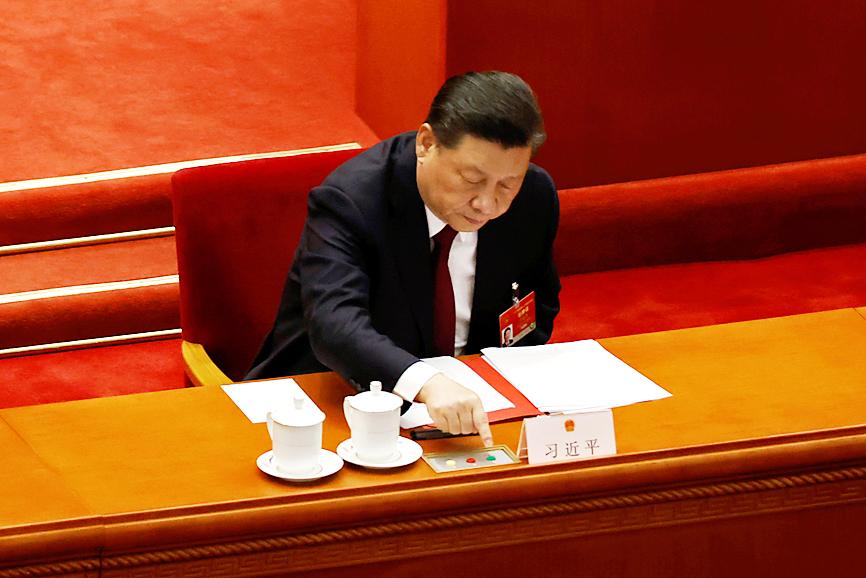Chinese lawmakers approved an extensive overhaul of how Hong Kong chooses its leaders, a momentous step in Beijing’s efforts to curb opposition in the territory’s political system.
The Chinese National People’s Congress yesterday passed almost unanimously a proposal to change the size and composition of the body that picks the territory’s chief executive, and have it nominate local legislators.
The congress also established a vetting committee to ensure that candidates in Hong Kong are “patriots,” effectively ending China’s only experiment with open elections.

Photo: Reuters
Hong Kong Baptist University associate professor Kenneth Chan (陳家洛) called it a “total purge of democratic figures” who had continued to play a prominent role in Hong Kong since the handover 24 years ago.
“This is the second handover, because the first one wasn’t very successful in Beijing’s eyes,” Chan said.
The passage of the “decision” was all but assured, even though it was only placed on the agenda a week ago and the full text was not published until after the vote.
About 2,895 lawmakers approved the revamp, with one abstention and none voting against.
Lawmakers in Beijing’s Great Hall of the People erupted in applause after the results were announced.
British Secretary of State for Foreign, Commonwealth and Development Affairs Dominic Raab said that the move would “further undermine confidence and trust in China living up to its international responsibilities.”
“This is the latest step by Beijing to hollow out the space for democratic debate in Hong Kong, contrary to the promises made by China itself,” Raab said in a statement.
The measure puts the force of law behind Chinese President Xi Jinping’s (習近平) call for “patriots” to run Hong Kong after a historic wave of pro-democracy protests in 2019.
The National People’s Congress Standing Committee — a legislative body of about 175 members that meets every two months — is expected to flesh out the overhaul before handing down the final plan for Hong Kong to implement.
On Monday, Hong Kong Chief Executive Carrie Lam (林鄭月娥) said that the revamp would require the Hong Kong Legislative Council to enact “more than 20 pieces of principle and subsidiary legislation,” which are to be pushed through without the usual public consultations.

The US government has signed defense cooperation agreements with Japan and the Philippines to boost the deterrence capabilities of countries in the first island chain, a report by the National Security Bureau (NSB) showed. The main countries on the first island chain include the two nations and Taiwan. The bureau is to present the report at a meeting of the legislature’s Foreign Affairs and National Defense Committee tomorrow. The US military has deployed Typhon missile systems to Japan’s Yamaguchi Prefecture and Zambales province in the Philippines during their joint military exercises. It has also installed NMESIS anti-ship systems in Japan’s Okinawa

‘WIN-WIN’: The Philippines, and central and eastern European countries are important potential drone cooperation partners, Minister of Foreign Affairs Lin Chia-lung said Minister of Foreign Affairs Lin Chia-lung (林佳龍) in an interview published yesterday confirmed that there are joint ventures between Taiwan and Poland in the drone industry. Lin made the remark in an exclusive interview with the Chinese-language Liberty Times (the Taipei Times’ sister paper). The government-backed Taiwan Excellence Drone International Business Opportunities Alliance and the Polish Chamber of Unmanned Systems on Wednesday last week signed a memorandum of understanding in Poland to develop a “non-China” supply chain for drones and work together on key technologies. Asked if Taiwan prioritized Poland among central and eastern European countries in drone collaboration, Lin

BACK TO WORK? Prosecutors said they are considering filing an appeal, while the Hsinchu City Government said it has applied for Ann Kao’s reinstatement as mayor The High Court yesterday found suspended Hsinchu mayor Ann Kao (高虹安) not guilty of embezzling assistant fees, reducing her sentence to six months in prison commutable to a fine from seven years and four months. The verdict acquitted Kao of the corruption charge, but found her guilty of causing a public official to commit document forgery. The High Prosecutors’ Office said it is reviewing the ruling and considering whether to file an appeal. The Taipei District Court in July last year sentenced Kao to seven years and four months in prison, along with a four-year deprivation of civil rights, for contravening the Anti-Corruption

NO CONFIDENCE MOTION? The premier said that being toppled by the legislature for defending the Constitution would be a democratic badge of honor for him Premier Cho Jung-tai (卓榮泰) yesterday announced that the Cabinet would not countersign the amendments to the local revenue-sharing law passed by the Legislative Yuan last month. Cho said the decision not to countersign the amendments to the Act Governing the Allocation of Government Revenues and Expenditures (財政收支劃分法) was made in accordance with the Constitution. “The decision aims to safeguard our Constitution,” he said. The Constitution stipulates the president shall, in accordance with law, promulgate laws and issue mandates with the countersignature of the head of the Executive Yuan, or with the countersignatures of both the head of the Executive Yuan and ministers or